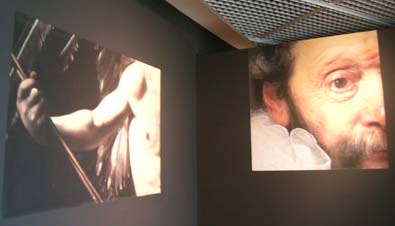Poetry
of course serves many functions; it reveals great beauty, evokes emotion,
communicates the intensity of an experience, or helps us access insight
and meaning.
Travel literature can also be as multi-dimensional
and multi-layered as poetry; and have the same beauty, grace, rhythm,
imaginative qualities, decorative style, and elevation of the human
spirit.
Gregory Monteith has travelled far
and wide on this planet, and he has seen it through his poetic eye.
Here are some of his travel visions.
On the Great Wall
On the Wall I met an old man,
His skin was the leather of life without shade,
Asking a price for his image through my camera lens,
I paid.
The Empire’s guards were often bribed
Allowing northern armies to pass.
Genghis Khan saw the Wall only for the bravery of the man who stood
guard.
Old man, are you a wall guard or an invader paying to pass?
For a token I steal your image
To pay for the imaginings that fail to last.
The old man holds his opium pipe,
Ready to smoke me away.
He wipes his rotting teeth
And straightens his Manchu braids.
How I had wanted to walk the Wall,
And be reborn, ancestor to these days,
To cross the earth between both sides,
Drawing history’s gaze.
To see the walls of great empires,
Now crumbled on the page,
What do I hold dearer,
The image,
Or the stones I have laid?
Marrakech
Geometric flower beds,
Wood and stone,
Coloured by the hands,
Clutching in prayer.
Cemeteries full of hungry cats,
Following me.
The loud electric speaker moans,
Carpets unrolled to repeat,
Yesterday’s prayer.
Red silken dancers,
Crashing cymbals drumming,
In the Place of Djema’a-al-Fna.
The song of the snake charmer,
Distorting,
Moroccan oil in smoke absorbing,
Without the Germans to laugh with
As their train pulls away.
High and thinking,
The desert for my thoughts on rooftops,
The song has lost its charm.
Old Africa!
Bury me outside your city walls,
For I have no religion,
But them all.
Jade Dragon Snow Mountain
I stand in awe,
Restlessly awed,
Jade Dragon Snow Mountain,
Resting
5500 metres above me.
You be eternal,
I’ll climb,
Free.
Ocean
The ocean is an eternal play,
The final scene,
The last act,
With no curtain to close.
A constant arrival,
Relentless,
For all manner of audience.
I search the ocean from the beach,
Each moment studied,
Each inspiration I scrawl in the sand,
Washed away,
By a receding tide,
Giving way to a new wave,
Like history turning,
But ageless,
Tireless,
Forever resurgent,
Never leaving my eyes alone,
Until my curtains close.
Never lending a view the same,
Cleansing eternally.
To this immortal witness,
I offer mortal thanks.
Santa Cruz
Lonely in my cottage, I leave,
Descending into the order of beings,
I disorder,
Sending the cottontails scattering,
As I walk among the sand dunes.
Silver green salamander,
Whips a tongue in sunlight across the pavement.
The dunes swarm in pools of verdant green.
Planted candles, rose tipped, burning in all seasons and shades,
Against all winds, blooming in clusters of green fists relieved.
Rows of gleaming white cottages,
Red tile rooftops in diagonal slopes,
White cubes and red triangles,
Geometric purities of line.
Cactus titans, violent-pronged, yellow-pointed horns,
Green stars blooming in the arid sands,
Palm trees eased by the wind,
A lighter rhythm of sway.
Yellow flower bells, cups of honey,
Spreading the hills, laying a feast of wild flowers.
I walk to the highway, black snake of the cliff,
White-tiled footpaths, black vulcan stones,
Mosaics of marine images,
Seahorses and whales in petrified forms.
I find a white spiral staircase
Descending from the deserted lovers plateau,
Reaching the sand in the cliff shadows
Where rivulets of fresh water fall in gentle veins down the rock face.
What laws of nature had I known!
No rock here is barren,
Blossoms everywhere,
The sand blooms,
Purple walls and pink shadows,
Chandeliers of salt crystal,
Orange rock rusting, crumbling in the heat.
Green slopes of candles lusting,
Pouring in streams,
Funneled to the cliff’s edge,
Where I linger, relieved of time,
Unfallen, longing for home,
Knowing my love waits at the end of this.
I will return,
I will end this exile,
As perfect isolation is no place for an imperfect being.
Fishermen stand along the beach,
In a quiet procession of deposed emperors,
Poles in hand, empty baskets, they wait,
Meditations of belonging to the sea,
They cast, lost in the tide,
Skin reddening.
They plant their poles in the sand,
And turning from the sea, converse,
Stories of the day, myths of conquest,
Watchmen, spies, sea visions of their ancestors,
Exploring in armour, returning with spices in the smoke of incense.
I walk the Avenida do Atlantico,
To the Jardim da Celeste.
In shades of purple and blue against a pearl sky
A soldier crosses a river on horseback,
Without an army to lead or follow,
Sword heavy on his shoulder, bloodless,
He searches for a new land to name,
For God and King.
Men and women harvesting the vine,
From grapes to sweet wines,
Pulling flavours from the land,
They bargain with the earth,
Toiling, the final terms unsung.
I peer into the depths of blue,
The sands of time,
I face the unknown,
Without ship, commission, God or King,
I plunge,
Emerging with the salts on my lips,
And my body washed.
I feel the sand under my feet,
Before my footprints disappear.
Further up the shore I see the footprints of another,
Am I followed,
Or merely following,
To discover, to conceive
What is not yet born.
Have I stumbled upon orphans,
The marooned?
I seek asylum from my asylum,
Praia da Formosa,
A labyrinth of coral stairs,
Twisting over the cliffs into the sea.
An ancient anchor lies on the beach,
Rusting, depthless in the sun,
The ships it floated long sunk,
The men it dragged screaming,
Long silenced by the crash of waves.
On the highest hill of Santa Cruz,
Above the labyrinth, the anchor, and the sea,
A small chapel of coral and shells
Waits, to the sounds of waves crashing storms,
And swirling foams the eye explores.
Spider webs cross the doorway
To the house of Santa Helena,
Padroeira de Santa Cruz.
Plastic flower offerings in pots on the floor,
A silver cherub stares out from the coral, arms folded,
Chin resting on still wings,
Unpainted eyes,
Forever open and closed.
Standing above the chapel,
Where the vertical and horizontal meet,
A white cross looms.
The gleaming cross and the rusted anchor,
One, ascending, pole star, facing the sky,
The other, marooned, shipless, decaying to the sands.
Both have dragged the depths of sea and self,
Before the unknown,
Where the spirit and body meet and part.
I sever the ties which weigh me,
And drift to my will,
Swayed by no design,
No staircase reaching,
No sun or horizon to navigate,
No omens, only interpretations.
I return to my cottage, restless,
Undiscovered,
In the sanctuary of Santa Cruz.
Capital
A box on rails,
Filled with people,
Wingless,
Conversing in a language I don’t speak,
Suspicion in their eyes on me.
“It’s morning,”
shout the magpies,
Called happiness birds.
From window sills to shaded trees,
Improvising song,
Unaccordingly.
Limbless child dragging herself across the pavement,
Sole hand pushing an empty incense burner,
A void among the crowds,
Few coins dropping.
Piracy on every street corner,
Nomadic vendors and tunnel-wise peddlers offering their wares.
Police over their shoulders,
Looking for a bribe.
The blind selling fortunes,
Men selling stolen cell-phones,
Market competition for the socialist paradise.
“This is not a song of happiness,” a magpie sings.
“I just want to wake you up dammit!”
A box on rails,
People shouting,
Pointing in the direction behind,
Others ahead,
No agreement on where to rest the dead,
Once the water and food are gone,
There’s little left,
Appetite too large,
To survive on needs.
A giant panda is sitting on the street corner,
White fur yellowed,
Black fur lost in shadow
Of the skyscraper.
Ignored by the traffic noise,
Shaking, trying to survive,
“But getting rich is glorious,”
S o the Organ grinds,
In all the newspapers,
On all the channels,
Pandas pressed against the iron-barred haze
Of ideology,
And Olympic decay.
“Wake up!” shouts the magpie, interrupting me.
I listen to him all morning,
Nice to hear a voice in the Capital
Shouting for change.
“We can put the bodies in the caves, like history, the people
won’t know,” grinds the Organ.
No, won’t work,
There are still 100 million people living in them.
A box on rails,
The windows flash,
With Imperial tombs burying the past.
The Great Tyrant
Lies in the Square,
His corpse preserved
To hide the smell of rot.
Plastic flowers laid by the people he starved,
Building palaces to himself,
Great harems and feasts,
Making the long march
Carried on a litter,
Murdering millions
By the hammer and sickle.
He’s taken their history.
To get it back,
Take the future,
Starting today,
Burying the monster who made you,
As orphans, reborn.
Honouring those
The Organ would have you forget.
No barricades in the streets,
The rising price of indifference,
“It’s too hard, there’s too many people!”
Yes, of course, there’s too many people
To make a difference.
How much does freedom cost?
Nine per cent annual growth,
The fastest growing economy in the world,
The fastest growing bomb in the world.
A river crossing,
The ferryboat has sunk,
This machine has made the ferryboat obsolete,
Periodic tunnels,
Too dark to write.
A man is slamming a door behind me
Laughing each time
It gets louder,
Another country girl sold into slavery,
It gets louder,
A forced prostitute, a forced marriage,
It gets louder,
The Organ grinding,
Quieting.
The solitude of monk-life
In a police state.
Religious freedom?
Under the watchful Organ,
Ask the untold hundreds of monks
Imprisoned in Tibet,
Guilty of having their own culture,
The way to mandala.
1989,
The cries that halted tanks
And caught the Eye
Are silenced,
By the crush of consumerism.
The Capital bleeds,
Blood in the Square,
No monument to honour the victims,
Only the murderers.
No public mourning for the families,
Of students and workers,
Who spoke their minds,
Wanting more for their people.
“Counter-revolutionaries!”
so the Organ grinds,
“Enemies of the getting rich!”
The Organ’s élite,
Toasting the CEOs of the West,
With a handshake,
Privatizing sunsets.
The soldiers fired into the crowds,
Killing and wounding the powerless,
To protect the powerful.
And the tanks roll on,
Flattening protests,
Paving the way for McDonalds and Walmart.
A Starbucks in the Forbidden City,
A KFC in the Temple of Heaven,
“Open for business,” the Organ grinds.
On Sale! Cheap labour for exploitation,
Sweatshops efficiently overcrowded.
On Sale! Virginal resources for plundering.
On Sale! Expendable coal miners, dying by the hundreds to keep smokestacks
billowing poisonous breath.
On Sale! 300 million migrant workers, their farms seized by developers,
flooding the cities, risking their lives to build the glittering metropoli
for a dollar a day.
A box on rails,
My desire to stop
Makes the box run faster,
A howling grind.
One word repeating itself,
Over and over,
I can’t hear it clearly through the masses.
Some are sleeping through this,
How can they,
With all the work to do.
Maybe their work is done,
They are stuck here, so the work is done.
I can’t sleep, still much to do,
A box to derail,
Have to push harder to do it.
The word, repeating over and over
In my head, in the air,
With the wheels to the rail,
A language none of us have spoken,
But all of us have heard.
Road of Cambodia
Holes in the road shake and pound the bus,
Of life,
How I seek to know it,
To understand the void full of potholes.
I’m only a visitor
To this red dust blood of the land,
Filling the ancient veins of the people,
Red skin of Cambodia,
Red dust of the trees,
Green within but fruitless,
Alive within but rootless.
Children playing in the ditch
Between the landmines,
Life a guess at where to step.
The children walk a straight line ahead,
Excited to be smiling,
Poor,
The cost of laughter is shared.
A starving laughter feeds,
So green within.
Alive,
This country of gravediggers.
I can only cross this land
On French bridges of steel,
The red dust keeps the source from me.
I followed a monk
I followed a monk
Down an alley of mud,
Brown earthen walls,
The maze scattering.
The puzzle of monastic life,
In the way of simplicity.
I followed a scarlet robe,
The dusty hem to the elegant fold,
I followed the dark narrows
Reflecting in cloudy pools,
Without a where or if I had started.
I followed at a distance of quiet,
Exhausted incense smoke,
Stepping lightly in prayer halls,
To the low hum of incantations,
Settling the ashes of dead lords.
I followed the rich embers
Of myriad colours
On woven tapestries,
Hand painted scrolls
Of wide-eyed Buddha.
I followed the golden idols,
Lost in the esoteric script
Of ancient volumes.
I followed the blind man
Until he saw me,
Drawing stares.
I gave to a morning
What others give to a lifetime,
And so I followed.
I followed a monk to his wooden gate,
Where he disappeared.
Monchique
Climbing a hill in the Algarve,
Met a man who lost his home,
Moved his family south
To live in the ruins of a medieval convent,
Laundry spread on a line,
Children playing in the dirt,
The sound of caged chickens.
His dog leashed to an altar,
Wearily smells my hand,
For the scent of fire.
Farther up the hill met an old man selling jars of honey,
His son played the guitar,
While I bought a jar and received a kiss on both cheeks.
I reached the top of the hill,
To see the mountains of Monchique.
The fires had died,
Leaving a black horizon of ashen trees.
The fires came from the north in orange waves,
Pouring over the hills in rivers of fire,
Birds fleeing through the smoke,
Families gathering to escape,
To lose their homes in a devouring glow
Choking the air, a pillage of smoke,
Purging the mountain towns,
Leaving nothing but a shell of dust,
And the lost root.
Green skin of the soil,
The rain has invited you,
Your presence made in emerald patches
Polished by the dew.
More rain needed, in torrents,
In fresh oceans,
To breathe the moisture and fill the pores,
To find the root,
Ferment the dust and pulse once more.
Newborn land lusting,
Bright blossoms bathed in light,
Fresh cork and olive,
Orange and lemon springs,
Infant eucalyptus, verdant oak and pine,
Cool shade on the hills,
Facing the sun, you will not dry,
And in the face of nature
The people will not hide.
Raise new homes over the memories of smoke,
Wash the ash from your hands,
And turn the soil of charred gardens.
Coming rains will soak and fertilize,
Streaming down the hills, lifepulse of the trees.
Gone are the streams of tears,
Gone are the dark faces,
Returning are the people to their mountains,
Kissing cheek to cheek.
Surviving to conceive,
Living for the redemption
Only nature breeds.
Old Women
Hello!
Looka! Looka!
Cheapa! Cheapa!
Hello Banana!
Hello Orange!
Hello Apple!
Cheap for you!
You say?
Oh, no money!
Make no money!
Okay, best price, hello!
cheap for you,
last price,
oh, no money,
okay, okay,
no money.
|
|
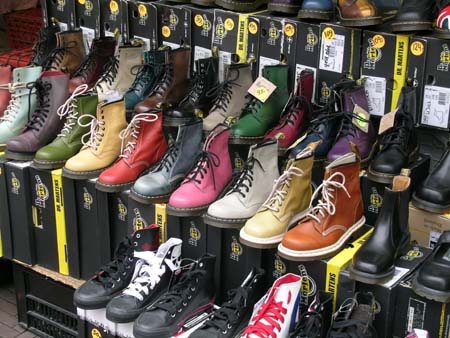
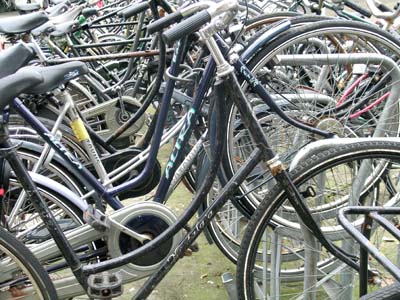
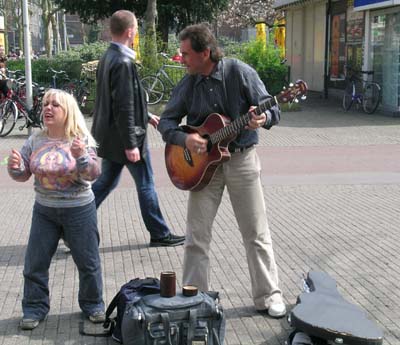
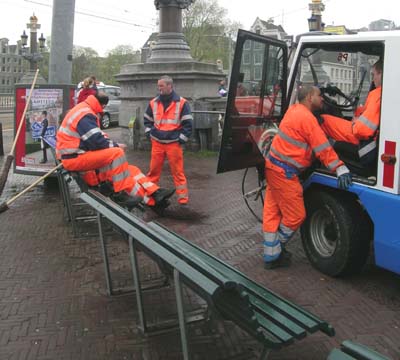
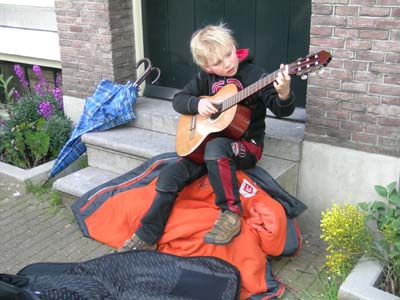

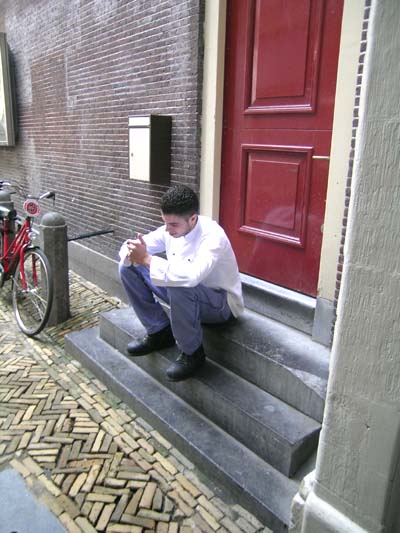
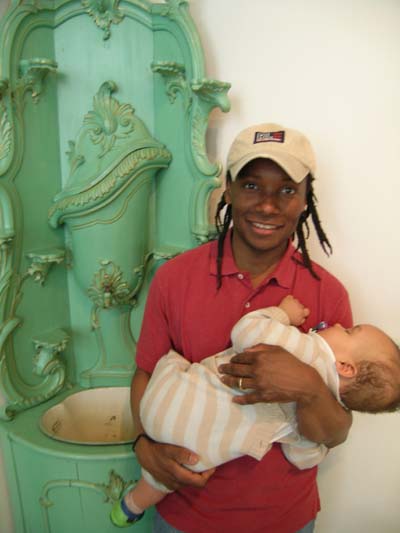
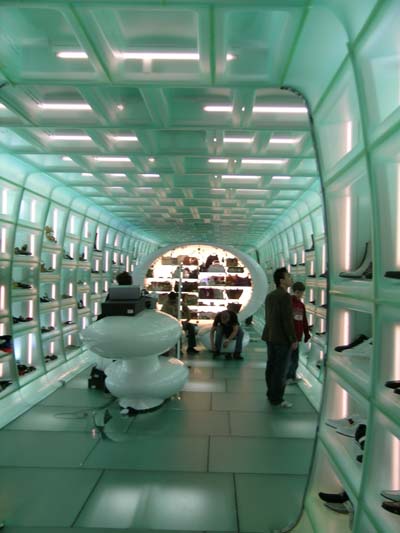
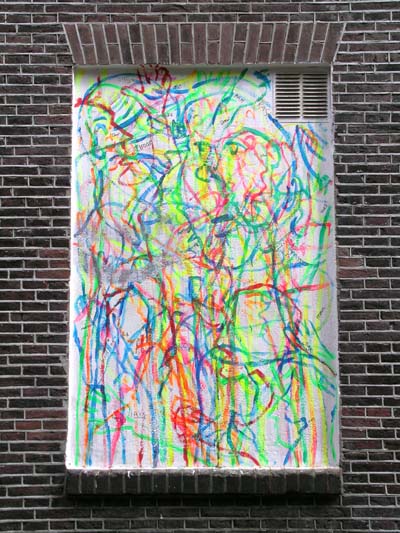
Amsterdam 2006 by Bob Fisher
Poems of Motion: Physical
and Spiritual
These Words
I am these words black and white,
You will know me by no name.
I offer you these words,
No flesh, no heart, no brain.
These words and nothing else.
You must not accept or interpret anything else as me,
Do not admit any other body I claim to be.
Not me in the wind.
Not me in the pond.
Nature is a season of iridescence,
I am black and white.
My only past is the blank page,
My only future, the page filled,
And by the page I am possessed,
I am belonged.
For the present I am these words as you pass away,
As a poem without a poet,
As a spirit without a god,
As a soul without a body,
Accept nothing else,
But these.
A Message Calling Back
You are called,
They came as you were dozing,
You’ll not sleep so soundly again,
Til resistance fails ‘gainst the end.
They’ve come calling,
Don’t pack a thing,
Not even your glass
Will help to see.
The walls are flesh thick
And age without you,
Carefully arranging windows and doors,
Hung in shape and colour to please the eye,
Unlocked, breathes the mind.
It was easy to find you
Amid the flowers dried,
Preserved in circles
Of root and organ joined.
You’ve lived well barefoot,
Trading buckets for the Well.
They must have been listening,
If you were heard,
The elements have been explained well enough,
Now comes the reason for the unreasonable,
The purpose, to call you
To purpose.
The maps understood.
The songs you have to sing,
Unsung,
Will you answer?
The Wheel
A spinning prayer slows,
As we leave the line,
But the wind blows,
And the earth turns,
Where leads the wheel without us?
Not the wheel made,
Or the wind planned
For an earth of sand.
The wheel will not spin its own,
The prayer has lost its line,
The sundial shady under pavement skies,
The clock rusted by a flood
Of ancient echoing cries.
No will even to break the rhyme.
But a prayer set in spin
Turns the figures ‘round one source,
Follow the idols on one course,
Carving a moment out of time,
Shared will setting circles back in line,
Design random,
Breaking rhyme,
Prays the wheel.
Emergency Ode
When I was nineteen I drove to Lowell Massachusetts to find Jack
Kerouac.
Strange to think he’d really come from somewhere,
Some small town I could find on a map.
In my head I see him and he’s always moving,
Strange to find where he started from.
I asked directions to the graveyard,
Strange American graveyard with street signs dividing the rows.
I wandered around for awhile, then I saw this little pile of scattered
coloured objects which stood out from all the other gray stones, green
grass, and dead flowers.
I approached, and found the grave,
A simple stone lying flat in the ground.
Sure enough he was there lying in the middle of America.
Scattered around the grave were empty liquor bottles and empty packs
of smokes.
They said Jack died from his drinking,
I have many pictures of him smoking cigarettes.
In front of the grave I knelt down to get closer on a worn patch
of dirt.
The grass over his grave had all been worn away.
Maybe from people kneeling, like me, maybe from all the people who’d
stood there waiting, I wondered.
Maybe someone had been clawing at the ground,
Or maybe the grass would not grow here.
I sat there quietly like the remains under me.
This was the grave of a writer,
A writer turned to dust.
One day when Jack was a little boy in Catholic school the priest
found him crying in the corner. The priest sat down and asked him
what was wrong. The boy looked up in the priest’s eyes, puffy
red face.“All the kids are laughing at me,” he cried.
“Oh but why”, the priest answered. “‘Cause
I told them I want to be a writer and they called me a sissy.”
Jack wrote eleven novels in 10 years, and not because they were
being published, because they weren’t. He kept writing because
he believed in what he saw, he wrote like he breathed, wrote because
he had to. “Gotta use words ‘cause the heart don’t
speak.”
And all he wanted was God to show his face.
When On the Road was published in 1957 he’d already
written over a million words, in novels, poems, plays, scriptures,
confessions. He often told friends his greatest achievement in life
was that he was a writer.
Be a writer Allen Ginsberg
Move out to San Francisco, live in a cottage in Berkeley, surround
yourself with rose bushes, write poetry and drink cheap wine with
your new friends.
Break the rules, find and follow your madness, do what you want
and hurt no one, learn how to write for your own pleasure,
Scrawl indecent truths on the wall then break it down,
Fall in love with everybody,
Listen to your visions,
Make friends with hoboes, junkies, outlaws, the moon,
Study Asian religion, Tibetan-Buddhism, meditate,
Follow poetry toward the Truth,
Read it aloud with your pants down,
Experiment, write without fear, let the imagination just go, no secrets,
just write for your own soul to hear.
William Burroughs
Be the most unpopular boy in town, be the walking corpse, tall bony
crystal white skin,
Be a trouble maker in school, be a homosexual, be a con-man,
Graduate from Harvard and hate the place, but use the library while
you’re there.
Learn about addiction, not only drugs, but all forms of addiction,
sexlovepowermoneyfameGodstatus, whatever chooses you.
Make the main theme of your work sickness, the sickness of the atomic
age, blowing up all around us and inside you.
Take a look at control, obsession of the western mind, get outside
that control, beat it at its own game.
Make life into an emergency you have to respond to,
Break convention, cherish ugliness and how it denies the dictatorship
of class.
And if its too much, get out, go on the run with no disguise, live
in Mexico, North Africa, India, Paris, London, South America, the
Bruce Trail.
Tell people you’re a secret agent,
Tell people you’re an alien,
Tell people you’re a saint,
Tell people you’re an artist and you don’t care if you
get paid.
1942
Jack was twenty, he wanted adventure, so he joined the war thinking
he should help. Then he realized that all life really is suffering
like the Buddha says, and he wasn’t gonna suffer on a battlefield
for someone else’s war.
Jack threw down his rifle and went to hide in the library.
They called him a paranoid schizophrenic,
But he kept going, madness if that’s what it takes,
Enter through that suffering with sympathy,
Enter through that suffering with forgiveness,
Enter through that suffering with faith in your own words, so much
inside needing to be said, only place it could come out, the only
place it could really reach out and feel the sun was the lonely highway
west, a road long enough to contain his energy, a horizon far enough
away to temper his dream.
So he went, and he kept on going,
Where we goin’ Jack?
I don’t know, but I know we gotta get there.
New York, Times Square, strange conversations drowning in smoky jazz,
San Francisco’s Market Street to North Beach, south to Mexico,
north to Desolation Peak, where you look down one side and its Washington
state then you look down the other side and it's Canada,
Stay with me now,
Stay out all night right now,
Drugs, some are great for writing, but not all, staying up for days
pounding down on that typewriter until your fingers ache and your
fingerprints are gone and all that remains are your words and your
ashes.
In the graveyard kneeling that afternoon in the summer I realized
Jack was not in the ground under my knees.
He’s out there somewhere on that road with a pack over his shoulder
and the pages full and left behind his weary eyes.
He went out there so far that he never came back.
He sent pages back here for us but he never came home.
You can’t bury his words.
I rose up from the grave and looked down one last time.
The graveyard was quiet but I wasn’t dead yet.
I warned myself about what it takes to be a writer,
I remembered what was written on John Keats’ grave in Rome:
“Here lies a writer whose name was writ in water.”
Beneath Jack’s name the inscription reads, “He honored
life.”
I collected a handful of old dirt to take with me and left the graveyard,
Alive.
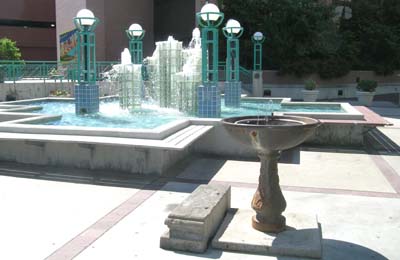
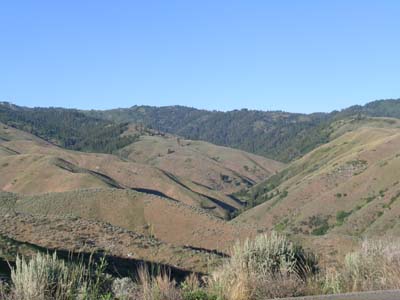
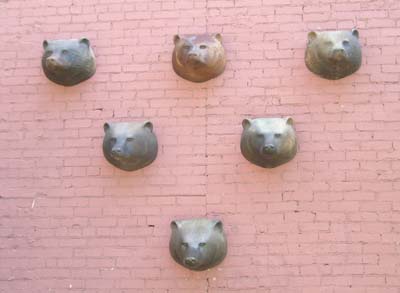
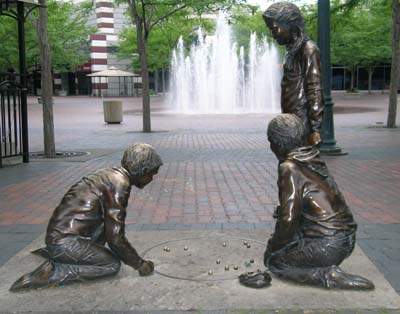
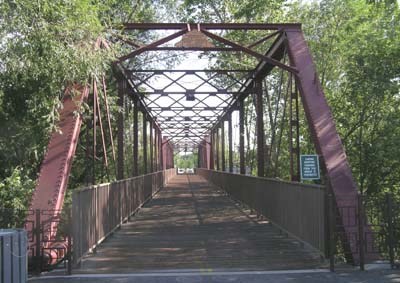
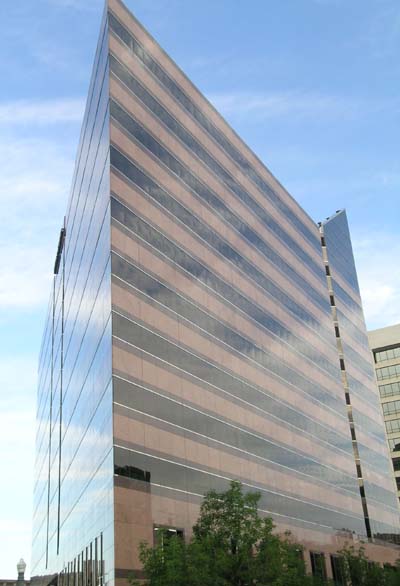
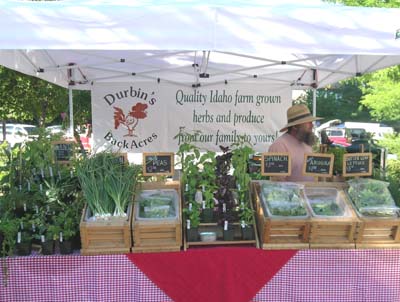
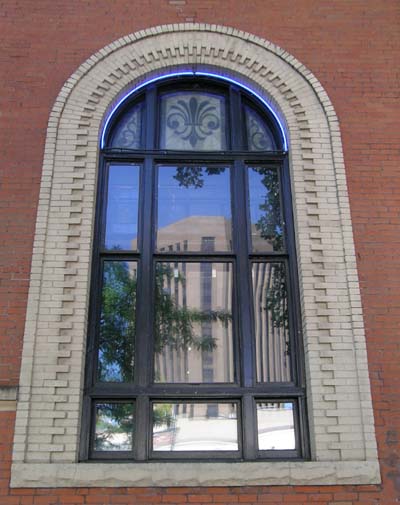
Boise, Idaho 2006, by Bob Fisher
|
|
